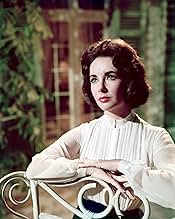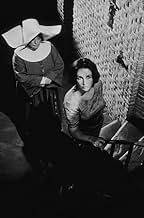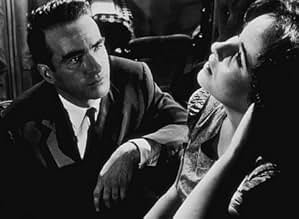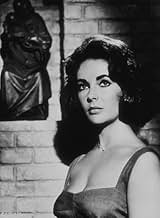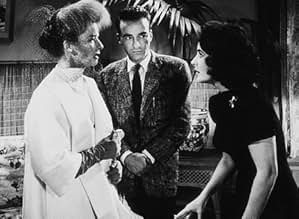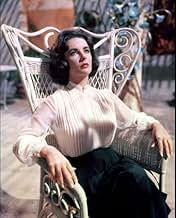CALIFICACIÓN DE IMDb
7.5/10
18 k
TU CALIFICACIÓN
A un cirujano se le asigna un caso de una joven cuya tía quiere que la lobotomicen para encubrir un secreto familiar.A un cirujano se le asigna un caso de una joven cuya tía quiere que la lobotomicen para encubrir un secreto familiar.A un cirujano se le asigna un caso de una joven cuya tía quiere que la lobotomicen para encubrir un secreto familiar.
- Dirección
- Guionistas
- Elenco
- Nominado a 3 premios Óscar
- 4 premios ganados y 7 nominaciones en total
Sheila Robins
- Dr. Hockstader's Secretary
- (as Sheila Robbins)
Erik Chitty
- Asylum Inmate
- (sin créditos)
Grace Denbeigh-Russell
- Asylum patient
- (sin créditos)
Brenda Dunrich
- Nurse
- (sin créditos)
Eddie Fisher
- Street Urchin
- (sin créditos)
Anthony Lang
- Inmate
- (sin créditos)
Aileen Lewis
- Nurse
- (sin créditos)
Opiniones destacadas
New Orleans, 1937. Doctor Cukrowicz is summoned to the home of Violet Venable, he is encouraged to go by his father who sees a ripe opportunity to get a significant amount of funding directly out of the rich widow. Venable tells Cukrowicz of her niece, Catherine, who has been diagnosed as having a mental disease that causes her to have outbursts etc. She wants Cukrowicz to carry out a lobotomy on Kathryn without question. However Cukrowicz meets with Catherine and finds her trapped behind memories that she won't let herself remember. He tries to draw out whatever her stepmother is so desperate to have cut out.
I watched this with no prior knowledge of what it was about or any of the hidden themes that are brought out after viewing. I suspect I was able to come to it `clean' as a result. The plot starts simply and I wasn't sure where it was going. Then Mrs Venable is introduced and we learn of her desire to have Catherine lobotomised. This is followed by the question what happened to Sebastion (Venable's son) that has sent Catherine mad and sent Mrs Venable to the point where she wants to cut it out of her memory. This question looms large over the film and is very effective in driving the plot forward.
The clues are given all along to what a messed up situation the whole thing is and the final 15 minutes are powerful despite some weaknesses. The plot has talked up the romance part of the film between Catherine and Dr Cukrowicz, I assume to try and cover the unpleasant business and make it easier on a fifties audience, this takes away a little bit but didn't distract me too much from the central tale.
Hepburn is magnificent in her role and her opening scene does much to captivate you for the rest of the movie. Taylor is good but at times feels too polished to be in her character's predicament. Clift was too stale for me and didn't really stand out when placed beside these two actresses going hell for leather for their roles.
Overall I enjoyed this film. The tension of the central questions is built on well with mystery and dark secrets hinted at constantly. The underlying themes add to it but you don't lose anything if you don't see them and the dark secret is powerful and meaningful even if it must do well by the censors of the day. Glad I stumbled onto it.
I watched this with no prior knowledge of what it was about or any of the hidden themes that are brought out after viewing. I suspect I was able to come to it `clean' as a result. The plot starts simply and I wasn't sure where it was going. Then Mrs Venable is introduced and we learn of her desire to have Catherine lobotomised. This is followed by the question what happened to Sebastion (Venable's son) that has sent Catherine mad and sent Mrs Venable to the point where she wants to cut it out of her memory. This question looms large over the film and is very effective in driving the plot forward.
The clues are given all along to what a messed up situation the whole thing is and the final 15 minutes are powerful despite some weaknesses. The plot has talked up the romance part of the film between Catherine and Dr Cukrowicz, I assume to try and cover the unpleasant business and make it easier on a fifties audience, this takes away a little bit but didn't distract me too much from the central tale.
Hepburn is magnificent in her role and her opening scene does much to captivate you for the rest of the movie. Taylor is good but at times feels too polished to be in her character's predicament. Clift was too stale for me and didn't really stand out when placed beside these two actresses going hell for leather for their roles.
Overall I enjoyed this film. The tension of the central questions is built on well with mystery and dark secrets hinted at constantly. The underlying themes add to it but you don't lose anything if you don't see them and the dark secret is powerful and meaningful even if it must do well by the censors of the day. Glad I stumbled onto it.
Katharine Hepburn is a wealthy woman who uses her checkbook in the hopes of having her niece lobotomized in "Suddenly, Last Summer," a 1959 film directed by Joseph Mankiewicz and starring Elizabeth Taylor, Katharine Hepburn, Montgomery Clift, and Mercedes McCambridge.
Hepburn plays Mrs. Venable, whose son, Sebastian, died the previous summer of a heart attack. However, her niece Cathy, who accompanied Sebastian, has had a sort of breakdown and is institutionalized.
Mrs. Venable wants Cathy lobotomized. Before doing so, however, the gifted surgeon (Clift), sent there by his boss as Mrs. Venable dangles money for the hospital in front of him, becomes determined instead to find out what happened and how Sebastian really died.
This is a film that would never be made today - it's character-driven and has too much dialogue. It's a shame because the dialogue is excellent. A previous Mankiewicz film, "All About Eve," is word-rich as well, and there the dialogue sparkles. Here it is more poetic. And, like "Eve," the great roles are the womens.
Though references to homosexuality are only inferred, this film and the much more poorly adapted "Cat on a Hot Tin Roof" hold up very well today. With homosexuality much more discussed, the role this plays in both plots is very obvious, at least to this viewer.
In "Suddenly, Last Summer," Sebastian's proclivities are evident from the beginning as Mrs. Venable describes an almost husband-wife relationship with her son, claiming to the surgeon that Sebastian was "chaste" and that her relationship with him was enough for her son.
One of the comments here mentioned that "Cathy is crazy, like all Williams heroines." But in truth, Cathy like Blanche is disturbed (though Blanche may be a little closer to being nuts) and both are "put away" to shut them up - Blanche for her accusations against Stanley and Cathy because she knows how Sebastian really died.
Katharine Hepburn gives a brilliant performance as Mrs. Venable - charming but made of steel, her anger and jealousy toward her niece just barely beneath the surface.
Elizabeth Taylor gives one of her best performances under the strong direction of Mankiewicz. Taylor was blessed with great beauty but alas, not a great speaking voice. However, she is nevertheless very effective, particularly in her long, harrowing monologue near the end of the film.
Clift's passive portrayal of the surgeon is problematic, and one wonders why he was cast. The opening scene in which he performs an operation had to be redone many times because of his drunkenness and codeine addiction - he was washing down the pills with brandy; his voice quavers, he is unsteady on his feet, and his eyes are glassy.
He comes off a little better in the previous year's "Lonelyhearts," though in that film, he actually winces in pain when he has to sit. While Clift had the support of his fellow actors, he had none from Mankiewicz and producer Sam Spiegel.
Had it not been for Elizabeth Taylor's insistence, he would have been replaced. It seems cruel (as it did to Hepburn at the time) but Mankiewicz was trying to make a movie and Spiegel wanted it to be on budget - Clift's addictions and physical problems weren't helping. He couldn't remember lines; when he finally said them, he was often inaudible; and he was always late arriving on the set.
Fortunately for audiences, this wasn't his last big-budget role. Under the direction of Elia Kazan, he would do the magnificent "Wild River" and seemingly be more in control.
Despite this, "Suddenly, Last Summer" is an excellent, disturbing film, and is highly recommended. It's not Williams' best play, but it is served well in its film adaptation.
Hepburn plays Mrs. Venable, whose son, Sebastian, died the previous summer of a heart attack. However, her niece Cathy, who accompanied Sebastian, has had a sort of breakdown and is institutionalized.
Mrs. Venable wants Cathy lobotomized. Before doing so, however, the gifted surgeon (Clift), sent there by his boss as Mrs. Venable dangles money for the hospital in front of him, becomes determined instead to find out what happened and how Sebastian really died.
This is a film that would never be made today - it's character-driven and has too much dialogue. It's a shame because the dialogue is excellent. A previous Mankiewicz film, "All About Eve," is word-rich as well, and there the dialogue sparkles. Here it is more poetic. And, like "Eve," the great roles are the womens.
Though references to homosexuality are only inferred, this film and the much more poorly adapted "Cat on a Hot Tin Roof" hold up very well today. With homosexuality much more discussed, the role this plays in both plots is very obvious, at least to this viewer.
In "Suddenly, Last Summer," Sebastian's proclivities are evident from the beginning as Mrs. Venable describes an almost husband-wife relationship with her son, claiming to the surgeon that Sebastian was "chaste" and that her relationship with him was enough for her son.
One of the comments here mentioned that "Cathy is crazy, like all Williams heroines." But in truth, Cathy like Blanche is disturbed (though Blanche may be a little closer to being nuts) and both are "put away" to shut them up - Blanche for her accusations against Stanley and Cathy because she knows how Sebastian really died.
Katharine Hepburn gives a brilliant performance as Mrs. Venable - charming but made of steel, her anger and jealousy toward her niece just barely beneath the surface.
Elizabeth Taylor gives one of her best performances under the strong direction of Mankiewicz. Taylor was blessed with great beauty but alas, not a great speaking voice. However, she is nevertheless very effective, particularly in her long, harrowing monologue near the end of the film.
Clift's passive portrayal of the surgeon is problematic, and one wonders why he was cast. The opening scene in which he performs an operation had to be redone many times because of his drunkenness and codeine addiction - he was washing down the pills with brandy; his voice quavers, he is unsteady on his feet, and his eyes are glassy.
He comes off a little better in the previous year's "Lonelyhearts," though in that film, he actually winces in pain when he has to sit. While Clift had the support of his fellow actors, he had none from Mankiewicz and producer Sam Spiegel.
Had it not been for Elizabeth Taylor's insistence, he would have been replaced. It seems cruel (as it did to Hepburn at the time) but Mankiewicz was trying to make a movie and Spiegel wanted it to be on budget - Clift's addictions and physical problems weren't helping. He couldn't remember lines; when he finally said them, he was often inaudible; and he was always late arriving on the set.
Fortunately for audiences, this wasn't his last big-budget role. Under the direction of Elia Kazan, he would do the magnificent "Wild River" and seemingly be more in control.
Despite this, "Suddenly, Last Summer" is an excellent, disturbing film, and is highly recommended. It's not Williams' best play, but it is served well in its film adaptation.
This screen version, by Joseph L Mankiewicz, of Tennessee Williams' play isn't as highly thought of as it should be. It's not a classic and on occasions it comes over as crude and stilted, but it also has many fine things going for it. Although he never really opens it out, Mankiewicz gives it a fluency that isn't at all theatrical and although he often films scenes intimately and between only two characters, he ensures it is photographed and cut in a very cinematic fashion.
Unfortunately, one of the two people on screen during these 'cinematic' sequences is Montgomery Clift who is at his worst here. It was after his accident and he looks as if he's in pain. When he walks it's as if there is a board up his back and he talks as if out of the side of his mouth. Luckily, with him in these scenes is either Elizabeth Taylor or Katharine Hepburn or both and when they are on screen you don't pay too much attention to Clift.
Dilys Powell said Elizabeth Taylor was born to play Tennessee Williams and she was right. Indeed this may be her best performance after "Virginia Woolf". Catherine's lines don't have the kind of poetry in them that Violet Venable's does but Taylor finds a poetry of her own in her readings. She builds on her long speech at the end and is very moving, even if Mankiewicz can't resist 'showing' us, in flashbacks, what Taylor is telling us, as if he doesn't trust an audience to sit still and just listen to Taylor. (They would have to in the theatre).
As Violet, Hepburn has the showier part and she milks it for all it's worth. It's a great piece of acting because Violet never seems to be acting, though she tends to think of her life as a kind of performance, something she has passed on to her homosexual son, Sebastian. (If the old adage, 'my mother made me a homosexual', has any validity you don't have to look any further than here). She enters from above, descending in her small baroque lift, and Hepburn can see the comic potential in such an entrance. Moments later, however, she is recounting how the sea-turtles were devoured by flesh-eating birds in the Galapogos, and you can see just how dangerously unstable this woman really is.
Any film that has acting of this calibre automatically qualifies as worth seeking out, (you forgive the lame work of Clift and Gary Raymond and draw a blind over Mercedes McCambridge, though Albert Dekker is very fine), but this qualifies on other grounds; as one of the better Tennessee Williams adaptations, (he co-wrote it with Gore Vidal), as a flawed, dated but strangely fascinating example of how Hollywood viewed homosexuality at the time, (negatively, naturally, but any face, no matter how horribly distorted, so long as it was in the public gaze, was better than no face at all), and as a serious addition to the Joe Mankiewicz canon.
Unfortunately, one of the two people on screen during these 'cinematic' sequences is Montgomery Clift who is at his worst here. It was after his accident and he looks as if he's in pain. When he walks it's as if there is a board up his back and he talks as if out of the side of his mouth. Luckily, with him in these scenes is either Elizabeth Taylor or Katharine Hepburn or both and when they are on screen you don't pay too much attention to Clift.
Dilys Powell said Elizabeth Taylor was born to play Tennessee Williams and she was right. Indeed this may be her best performance after "Virginia Woolf". Catherine's lines don't have the kind of poetry in them that Violet Venable's does but Taylor finds a poetry of her own in her readings. She builds on her long speech at the end and is very moving, even if Mankiewicz can't resist 'showing' us, in flashbacks, what Taylor is telling us, as if he doesn't trust an audience to sit still and just listen to Taylor. (They would have to in the theatre).
As Violet, Hepburn has the showier part and she milks it for all it's worth. It's a great piece of acting because Violet never seems to be acting, though she tends to think of her life as a kind of performance, something she has passed on to her homosexual son, Sebastian. (If the old adage, 'my mother made me a homosexual', has any validity you don't have to look any further than here). She enters from above, descending in her small baroque lift, and Hepburn can see the comic potential in such an entrance. Moments later, however, she is recounting how the sea-turtles were devoured by flesh-eating birds in the Galapogos, and you can see just how dangerously unstable this woman really is.
Any film that has acting of this calibre automatically qualifies as worth seeking out, (you forgive the lame work of Clift and Gary Raymond and draw a blind over Mercedes McCambridge, though Albert Dekker is very fine), but this qualifies on other grounds; as one of the better Tennessee Williams adaptations, (he co-wrote it with Gore Vidal), as a flawed, dated but strangely fascinating example of how Hollywood viewed homosexuality at the time, (negatively, naturally, but any face, no matter how horribly distorted, so long as it was in the public gaze, was better than no face at all), and as a serious addition to the Joe Mankiewicz canon.
The moral majority's campaign to censor anything on the movie screen considered too taboo had an incredible impact on Hollywood during the 1930's right through to the 1970's. Censors went through Hollywood scripts, tearing out anything considered unspeakable, no matter how important it was to the plot at hand. It became an art form of sorts, for Hollywood film makers to veil their nasty little subjects so that the censors (who weren't that bright anyway) couldn't find it, but so that a smart audience could. Suddenly Last Summer is a classic example of this art in action.
Tennessee Williams was the toast of Broadway in the 1950's, with his melodramatic plays that often tackled heavy subjects such as addiction, adultery and in the case of this story, homosexuality. Katherine Hepburn plays a classic Tennessee Williams vamp, Violet Venable, a lady of means who is mourning the loss of her son. She has sought the help of a psychiatrist, played by Montgomery Clift, as she would like to have a lobotomy performed on her niece, who is apparently off her rocker (as most of Tennessee Williams' ladies are) and is spouting nasty rumors about the dead son.
Like most of Williams' work, Suddenly Last Summer flows along with over the top dialogue, the kind that actors love to sink their teeth into. I have not seen the original stage play but I suspect that this screenplay has been severely hacked to obliterate any talk of homosexuality. Venable's son was murdered while on vacation in Europe. If you take the dialogue literally you might believe that he was murdered for his religious convictions. If you read between the lines you will see that this was clearly a gay bashing.
Hepburn and Taylor both shine in their roles, that seem almost custom made for them. It's rare that Hepburn is cast as a villain, however, her performance leaves me wondering why she hasn't done it more often. Taylor's hyper-active hyper-ventilating, Catherine Holly works well here. Her own brand of melodramatic acting seems to compliment Williams' work.
Clift was a tad cardboard in his role as the psychiatrist, however, it is still interesting to watch this performance that was filmed after his face-altering car accident. One might think that he recently underwent a lobotomy. On the other hand, he is competent, and the performances of the actresses more than compensate.
Suddenly Last Summer works as a film, but I am hesitant to recommend to everyone. This is not an action flick, by any means, but rather a character piece. Scenes are long and they require your concentration, as important statements can be found between the lines. For fans of any of these actors, this is a must see!
Tennessee Williams was the toast of Broadway in the 1950's, with his melodramatic plays that often tackled heavy subjects such as addiction, adultery and in the case of this story, homosexuality. Katherine Hepburn plays a classic Tennessee Williams vamp, Violet Venable, a lady of means who is mourning the loss of her son. She has sought the help of a psychiatrist, played by Montgomery Clift, as she would like to have a lobotomy performed on her niece, who is apparently off her rocker (as most of Tennessee Williams' ladies are) and is spouting nasty rumors about the dead son.
Like most of Williams' work, Suddenly Last Summer flows along with over the top dialogue, the kind that actors love to sink their teeth into. I have not seen the original stage play but I suspect that this screenplay has been severely hacked to obliterate any talk of homosexuality. Venable's son was murdered while on vacation in Europe. If you take the dialogue literally you might believe that he was murdered for his religious convictions. If you read between the lines you will see that this was clearly a gay bashing.
Hepburn and Taylor both shine in their roles, that seem almost custom made for them. It's rare that Hepburn is cast as a villain, however, her performance leaves me wondering why she hasn't done it more often. Taylor's hyper-active hyper-ventilating, Catherine Holly works well here. Her own brand of melodramatic acting seems to compliment Williams' work.
Clift was a tad cardboard in his role as the psychiatrist, however, it is still interesting to watch this performance that was filmed after his face-altering car accident. One might think that he recently underwent a lobotomy. On the other hand, he is competent, and the performances of the actresses more than compensate.
Suddenly Last Summer works as a film, but I am hesitant to recommend to everyone. This is not an action flick, by any means, but rather a character piece. Scenes are long and they require your concentration, as important statements can be found between the lines. For fans of any of these actors, this is a must see!
While the symbolism here is about as heavy as a sledgehammer, it's offered in such artfully poetic style that only writers of the caliber of Tennessee Williams and Gore Vidal could give us. What they have done is provide KATHARINE HEPBURN with a role that fits her like a glove and where her mannered acting sits comfortably on a role she was born to play. She is totally mesmerizing as Mrs. Venable, a woman who has lavished all her hopes and dreams on her only son only to have them all swept away on a brutal summer day, "suddenly, last summer", under the hot Mediteranean sun. She gets to spout the most poetic dialog in the film, with ELIZABETH TAYLOR not far behind, especially during their frequent monologues.
This leaves MONTGOMERY CLIFT, as a surgeon who is asked to perform a lobotomy on Miss Taylor, hovering in the background and looking like a frightened sparrow most of the time, although it is he who uncovers the truth about last summer. Mr. Clift must have been at a difficult phase of his own personal life because he performs in a stiff, robot-like manner that makes him seem dubious as a skilled surgeon with steady hands.
All of this is highly melodramatic as only Tennessee Williams can muster, while at the same time affording us the luxury of watching two commanding performances from Hepburn and Taylor that were justifiably nominated for Oscars.
The tale seems burdened by too much heavy-handed poetry but somehow it holds the attention because of the forceful acting by a fine cast. Mercedes McCambridge is a standout as Taylor's mother in the sort of fluttery, birdbrain role one might suspect would be offered to Billie Burke if this had been filmed in the 1940s.
By the end of the film, Miss Hepburn is so far removed from reality that she thinks Dr. Sugar (Montgomery Clift) is her son Sebastian and seems more like a candidate for lobotomy than the plucky Miss Taylor. Taylor never quite has the air of vulnerability that the role demands, but she gives a colorful, if strident, performance as the poor victimized girl who was used as bait by her playboy cousin.
This leaves MONTGOMERY CLIFT, as a surgeon who is asked to perform a lobotomy on Miss Taylor, hovering in the background and looking like a frightened sparrow most of the time, although it is he who uncovers the truth about last summer. Mr. Clift must have been at a difficult phase of his own personal life because he performs in a stiff, robot-like manner that makes him seem dubious as a skilled surgeon with steady hands.
All of this is highly melodramatic as only Tennessee Williams can muster, while at the same time affording us the luxury of watching two commanding performances from Hepburn and Taylor that were justifiably nominated for Oscars.
The tale seems burdened by too much heavy-handed poetry but somehow it holds the attention because of the forceful acting by a fine cast. Mercedes McCambridge is a standout as Taylor's mother in the sort of fluttery, birdbrain role one might suspect would be offered to Billie Burke if this had been filmed in the 1940s.
By the end of the film, Miss Hepburn is so far removed from reality that she thinks Dr. Sugar (Montgomery Clift) is her son Sebastian and seems more like a candidate for lobotomy than the plucky Miss Taylor. Taylor never quite has the air of vulnerability that the role demands, but she gives a colorful, if strident, performance as the poor victimized girl who was used as bait by her playboy cousin.
¿Sabías que…?
- TriviaAccording to author Garson Kanin in his memoir "Tracy and Hepburn," Katharine Hepburn was reportedly so furious at the way Montgomery Clift was treated by producer Sam Spiegel and director Joseph L. Mankiewicz during filming that, after making sure that she would not be needed for retakes, she told both men off and actually spat at them (although it remains unclear just which one of the two she spat at, or if she spat at both).
- ErroresAlthough set in 1937, costumes, hairstyles and makeup worn by Dame Elizabeth Taylor are all contemporary in 1959.
- Citas
Catherine Holly: Is that what love is? Using people? And maybe that's what hate is - not being able to use people.
- ConexionesEdited into Esto es todo (2009)
Selecciones populares
Inicia sesión para calificar y agrega a la lista de videos para obtener recomendaciones personalizadas
Detalles
- Fecha de lanzamiento
- Países de origen
- Idioma
- También se conoce como
- Suddenly, Last Summer
- Locaciones de filmación
- Begur, Girona, Catalonia, España(village and old castle scenes)
- Productoras
- Ver más créditos de la compañía en IMDbPro
Taquilla
- Presupuesto
- USD 3,000,000 (estimado)
- Total a nivel mundial
- USD 9,830
- Tiempo de ejecución
- 1h 54min(114 min)
- Color
- Relación de aspecto
- 1.85 : 1
Contribuir a esta página
Sugiere una edición o agrega el contenido que falta



